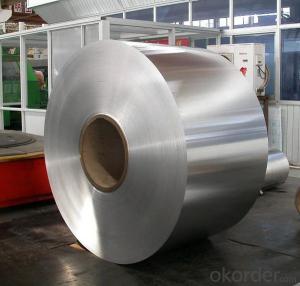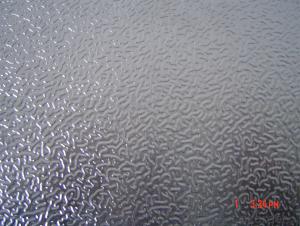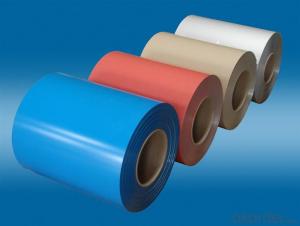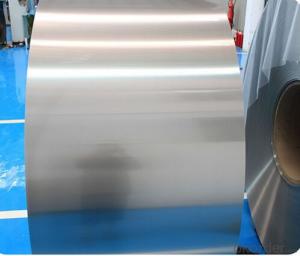AA1060 H12 Mill Finish Aluminum Coil China Supply
- Loading Port:
- Shanghai
- Payment Terms:
- TT OR LC
- Min Order Qty:
- 5 m.t.
- Supply Capability:
- 10000 m.t./month
OKorder Service Pledge
OKorder Financial Service
You Might Also Like
Item specifice
1. Specification of AA1060 H12 Mill Finish Aluminum Coil China Supply
Material | Alloy Aluminum 6063,6061,6005 or customer nominated |
Temper | T3, T4, T5, T6 |
Surface | Anodize, electrophoresis, powder coating, PVDF coating, wood grain painting, matted, etc. |
Colour | Any colour based on Standard Germany RAL Mark |
Length | Coating 6.5 meters, Anodizing 6.5 meters, Mill finish 5 meters |
Press Machine | 500-4000 tons all together 64 press lines. |
Fabrication | 1. Windows and doors; 2. Drilling; 3. Bending; 4. Cutting; 5. etc. |
Certificate | ISO 9001 |
Moulding | 1. Using our moulds, no fee; |
2. Using customer drawing, opening mould, usually about 10~50 tons then the moulding can be refunded. | |
3. Mould cost is negotiable base on the order quantity | |
Capability | Annual output 100,000 tons |
2. Application of AA1060 H12 Mill Finish Aluminum Coil China Supply
(1).Interior: wall cladding, ceilings, bathrooms, kitchens and balconies, shutters, doors...
(2).Exterior: wall cladding, facades, roofing, canopies, tunnels,column covers , renovations...
(3).Advertisement: display platforms, signboards, fascia, shop fronts...
3. Feature of AA1060 H12 Mill Finish Aluminum Coil China Supply
*Such coil is specially designed to replace aluminum ingot, due to the high export tax of aluminum ingot, the coil has better price than ingot.
*This type of coil can fit customer's remelting furnace just like ingot, no need to make any change to the production line that was previously used for ingot. The standard coil size and weight is very suitable for the feed gate of furnace.
*This type of coil causes less material wastage than ingot when remelted.
*Our coil is made directly from ore, no need to go though the ingot making process, quality is much better than other suppliers who use ingot scrap to make coil.
Be free from Oil Stain, Dent, Inclusion, Scratches, Stain, Oxide Dicoloration, Breaks, Corrosion, Roll Marks, Dirt Streaks and other defect which will interfere with use
4. Certificate:
SGS and ROHS(if client request, paid by client), MTC(plant provided), Certificate of Origin(FORM A, FORM E, CO), Bureau Veritas and SGS (if client request, paid by client), CIQS certificate
5. Image of AA1060 H12 Mill Finish Aluminum Coil China Supply
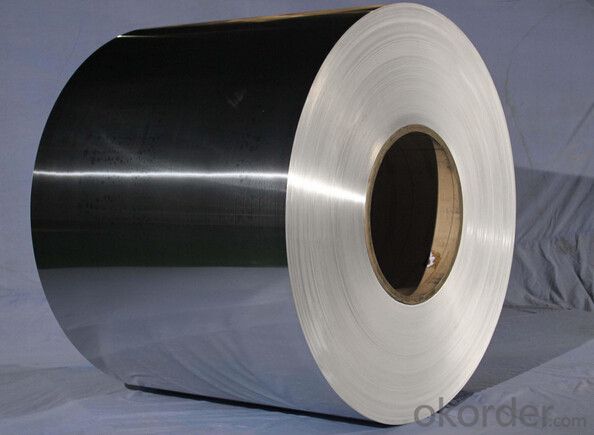
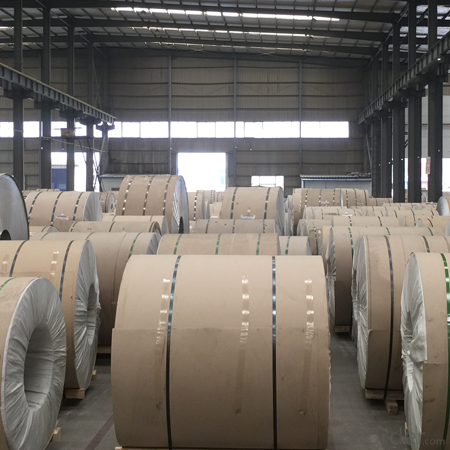
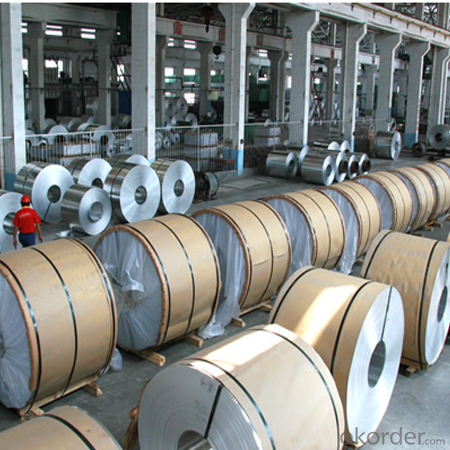
6. Package and shipping of AA1060 H12 Mill Finish Aluminum Coil China Supply
eye to wall
eye to the wall
with wood pallet (wooded case also available)
7. FAQ
1) What is the delivery time?
Dpends on actual order, around 20 to 35 days
2)What is the QC system:
We have QC staff of 20 persons and advanced equipment, each production is with MTC traced from Aluminum ingot lot.
3) What market do you mainly sell to?
Australia, America, Asia, Middle East, Western Europe, Africa etc
- Q:How are aluminum coils stored in a warehouse?
- Aluminum coils are typically stored in a warehouse by stacking them vertically or horizontally, depending on the size and weight of the coils. They are often placed on pallets or racks to maximize storage space and ensure stability. Additionally, protective packaging materials, such as plastic or cardboard, may be used to prevent damage and maintain the integrity of the coils during storage.
- Q:Can aluminum coils be used in the production of electrical enclosures?
- Yes, aluminum coils can be used in the production of electrical enclosures. Aluminum is a popular choice for manufacturing electrical enclosures due to its excellent conductivity, lightweight nature, and corrosion resistance. The use of aluminum coils allows for the production of seamless and sturdy enclosures, ensuring efficient heat dissipation and protection for electrical components. Additionally, aluminum coils can be easily molded and formed into various shapes and sizes, providing flexibility in design. Overall, the use of aluminum coils in the production of electrical enclosures is a reliable and cost-effective solution.
- Q:What are the standard sizes of aluminum coils?
- The standard sizes of aluminum coils can vary depending on the specific industry and application. However, there are a few common standard sizes that are widely used. For general industrial applications, the standard width of aluminum coils ranges from 36 inches to 72 inches. The thickness of these coils typically varies between 0.018 inches to 0.125 inches. The length of the coils can vary, but it is commonly around 1,000 feet or more. In the construction industry, the standard sizes of aluminum coils can be different. The width can range from 24 inches to 48 inches, and the thickness can be between 0.019 inches to 0.032 inches. The length of these coils can also vary depending on the specific project requirements. It is important to note that these sizes are just general guidelines and can vary depending on the specific manufacturer, industry requirements, and customer preferences. It is always recommended to consult with the manufacturer or supplier to determine the exact standard sizes available for aluminum coils in your specific industry.
- Q:I take an extracurricular aircraft class, and I got the okay to take some old painted sheet aluminum for another project I'm working on. The problem is, what I'm using it for I need bare aluminum. I heard around that air crafts are painted with something that regular (store-bought) paint stripper can't remove. Is this true? I am aware of the fact that stripping something like that will result in a toxic paint sludge, so I've taken precautions for that. I just need to know if heavy-duty paint stripper from Home Depot will do the job. Thanks :)
- By the time you get done screwing around with different kinds of strippers, it would probably be cheaper to buy a sheet of aluminum. The USAF uses a baking soda blaster to strip paint during depot level maintenance.
- Q:I have heard that aluminum may be a contributing agent in causing Alzheimer's disease, and that if we drink from aluminum cans, that we get aluminum into our system from them. It seems like this would be pretty easy to test in a laboratory, whether or not there are aluminum particles in the contained beverage. But I have heard or read that the inside of the cans are coated with something. So is this just typical uninformed rumors from the Internets, or is there anything to it? Hate to sound rude, but I am not really interested in opinions, like Well I don't think they would sell them if... or Oh yes, I think you get lots of aluminum from it. I am only interested in facts, not gut feelings or opinions.
- I recently covered this in a materials science class I am taking. My professor is Dr. Han Choo. Most aluminum cans have a coating of epichorohydrin. This is not to keep out the aluminum from the drink, but rather it is meant to keep the drink from reacting with the can(many sodas can actually eat through metal). The reaction of the soda with the can ruins the taste which is obviously something soda companies do not want. Aluminum also does not cause Alzheimer's. The metal is considered poisonous in large quantities and the FDA restricts the amount that can be added to drugs, food, drink, etc., but scientific consensus states that there is no link between Alzheimer's disease and aluminum. As far as BPA(Bisphenol A) health concerns go, there is little evidence proving any real harm to adults. The problems are only seen in offspring of the rodents being tested with BPA. For the most part there is little concern about the negative results of BPA exposure. There has not been any clear links in humans yet either. Extensive testing is still being done and BPA might be marginally dangerous to infants, but I wouldn't worry about it too much. If you still wish to guard yourself against BPA you should be aware that BPA is used in almost all commercial plastics and can liners(bottles, canned food, food storage containers, etc.) not just in aluminum cans.
- Q:How do aluminum coils contribute to noise reduction in buildings?
- Aluminum coils contribute to noise reduction in buildings through their ability to dampen and absorb sound waves. The coil's structure and material properties help to minimize the transmission of airborne noise, preventing it from entering or exiting a building.
- Q:Aluminum silicate felt fiber needle blanket noise reduction?
- And in the heat insulation, aluminum silicate needled blanket technology with a special one-time plastic molding, as the car chassis fireproof heat insulation layer, and now Xiamen Kinglong has reached a cooperation agreement.
- Q:Can aluminum coils be used in telecommunications infrastructure?
- Telecommunications infrastructure can employ aluminum coils as they possess several advantages. Firstly, aluminum, being a lightweight and durable material, finds extensive use in various industries, including telecommunications. Its cost-effectiveness, when compared to metals like copper, makes it a preferred choice for many companies in this sector. Moreover, the lighter weight of aluminum coils facilitates easier handling and installation, resulting in reduced labor and transportation costs. Additionally, aluminum's excellent electrical conductivity makes it suitable for transmitting data signals in telecommunications networks. By effectively carrying electrical current, aluminum coils ensure efficient data transmission without compromising quality. Consequently, reliable and high-speed communication over long distances becomes possible. Another advantage of incorporating aluminum coils in telecommunications infrastructure lies in their resistance to corrosion. When exposed to air, aluminum naturally forms a protective oxide layer, preventing rusting and corrosion. This resistance enhances the longevity and durability of the infrastructure, thereby reducing maintenance and replacement expenses over time. Nevertheless, it is crucial to acknowledge that aluminum possesses lower tensile strength than copper. Therefore, the infrastructure's structural integrity must be adequately considered and engineered when employing aluminum coils. Additionally, specific connectors and compatible hardware may be necessary. In conclusion, the use of aluminum coils in telecommunications infrastructure is highly effective due to their cost-effectiveness, lightweight nature, electrical conductivity, and corrosion resistance. Proper planning and design are imperative to ensure the successful implementation of aluminum coils in telecommunications networks.
- Q:Can aluminum coils be used in high-pressure or high-temperature environments?
- Aluminum coils are not typically recommended for use in high-pressure or high-temperature environments. While aluminum is known for its high thermal conductivity and corrosion resistance, it has certain limitations when exposed to extreme conditions. In terms of high-pressure environments, aluminum coils may not possess the necessary strength and durability required to withstand the forces exerted by the pressurized system. Aluminum has a lower tensile strength compared to other metals like steel or titanium, which makes it more prone to deformation or failure under high pressure. Therefore, it is generally advised to use materials with higher strength and pressure ratings in such scenarios. Similarly, aluminum coils have a relatively low melting point compared to metals like steel or copper. The melting point of aluminum is around 660 degrees Celsius (1220 degrees Fahrenheit), which makes it susceptible to damage or failure in high-temperature environments. In applications where the temperature exceeds the melting point of aluminum, it is recommended to use materials with higher temperature resistance. However, it is worth mentioning that there are specialized alloys and coatings available that can enhance the high-temperature and high-pressure capabilities of aluminum. These modifications can improve its strength, heat resistance, and corrosion resistance, making it suitable for certain applications in extreme conditions. Nonetheless, the specific requirements and limitations of the intended environment should be carefully considered before deciding to use aluminum coils. Consulting with experts and considering alternative materials may be necessary to ensure the safety and efficiency of the system.
- Q:Are aluminum coils suitable for heat exchangers?
- Aluminum coils are indeed a fitting choice for heat exchangers. This is because aluminum possesses exceptional thermal conductivity, making it highly efficient and effective in transferring heat between mediums. Its ability to swiftly transfer heat from one medium to another is particularly advantageous for heat exchangers that require efficient heat transfer. Furthermore, aluminum coils are lightweight, resistant to corrosion, and boast excellent durability. These qualities contribute to their popularity in a wide range of applications, including heat exchangers. The corrosion resistance of aluminum ensures that the coils can endure harsh environments and prevent the occurrence of rust or corrosion, thereby prolonging the heat exchanger's lifespan. Moreover, aluminum coils are easily moldable and can be shaped into various forms, allowing for flexibility in designing and constructing heat exchangers. This adaptability makes them suitable for a diverse array of applications, such as HVAC systems, refrigeration units, and automotive cooling systems. In conclusion, the high thermal conductivity, lightweight nature, corrosion resistance, durability, and versatility of aluminum coils make them well-suited for heat exchangers. These properties establish aluminum coils as an excellent choice for achieving efficient heat transfer in numerous industries.
1. Manufacturer Overview |
|
|---|---|
| Location | |
| Year Established | |
| Annual Output Value | |
| Main Markets | |
| Company Certifications | |
2. Manufacturer Certificates |
|
|---|---|
| a) Certification Name | |
| Range | |
| Reference | |
| Validity Period | |
3. Manufacturer Capability |
|
|---|---|
| a)Trade Capacity | |
| Nearest Port | |
| Export Percentage | |
| No.of Employees in Trade Department | |
| Language Spoken: | |
| b)Factory Information | |
| Factory Size: | |
| No. of Production Lines | |
| Contract Manufacturing | |
| Product Price Range | |
Send your message to us
AA1060 H12 Mill Finish Aluminum Coil China Supply
- Loading Port:
- Shanghai
- Payment Terms:
- TT OR LC
- Min Order Qty:
- 5 m.t.
- Supply Capability:
- 10000 m.t./month
OKorder Service Pledge
OKorder Financial Service
Similar products
New products
Hot products
Hot Searches
Related keywords
